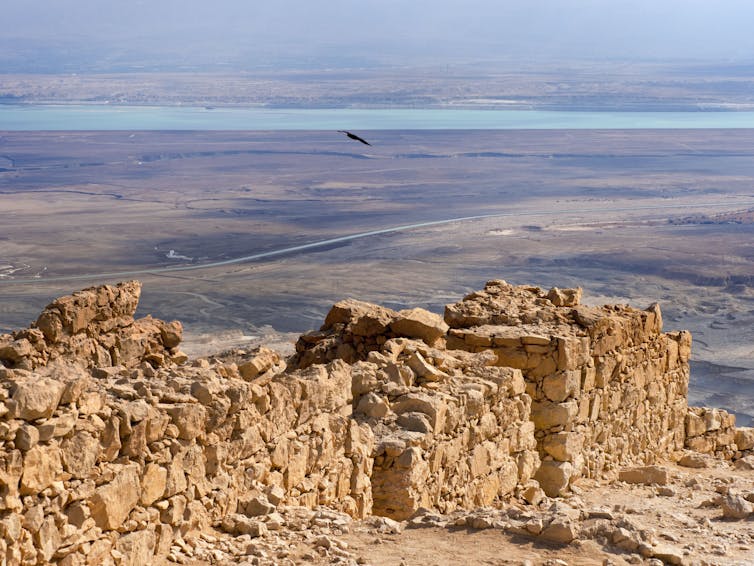Most Israelis dislike Netanyahu, but support the war in Gaza – an Israeli scholar explains what’s dr
Israelis’ and Jewish people’s long-held feeling of persecution, dating back to biblical times, contributes to most Israelis’ desire to continue the war in Gaza.

Eight months after Israel invaded the Gaza Strip, some critics observe that the Israeli military hasn’t met either of its goals of destroying Hamas and rescuing all of the remaining 133 hostages Hamas is holding.
Yet two-thirds of Israelis still support their military’s aggressive approach in Gaza – including limiting humanitarian aid to Palestinians.
While many Israelis support the military’s war in Gaza, most Israelis have also lost confidence in Prime Minister Benjamin Netanyahu’s government and would like to see new political leadership.
As someone who has studied Israeli politics for almost three decades, I believe it’s important to understand what elements contribute to Israelis’ collective mindset to explain these seemingly contradictory dynamics and views.

A familiar feeling of persecution
Hamas militants killed an estimated 1,200 people in Israel on Oct. 7, 2023, and took 240 hostages back to Gaza.
The brutal Oct. 7 murders and the extermination of entire communities in southern Israel left Israelis feeling shocked, vulnerable and insecure. The attacks reminded Israelis that the country faces existential threats, which they believe need to be eliminated in any way possible.

Jewish people have long been persecuted, dating back from the biblical era to the Holocaust during World War II. Some scholars call this feeling of a constant, looming risk of persecution the “Masada syndrome.” Masada, an ancient fortification in southern Israel, was where the ancient Kingdom of Israel waged a final battle against the Roman army in A.D. 73. Masada was eventually destroyed and all its Jewish inhabitants committed suicide in order to avoid becoming enslaved by the Romans. Jews then lost their political independence for almost 2,000 years, until Israel was established in 1948.
The story of Masada is still taught and remembered in Israel as a constant reminder that Jewish people cannot ever fully rely on the mercy or help of other countries – and that Jewish identity and independence are always at risk of persecution. For a long time, the Israeli Defense Forces held induction ceremonies atop Masada, which is also a popular tourism site.
As a ceremonial text used during the Jewish holiday of Passover says, “Each and every generation they rise up against us to destroy us.”
The Masada syndrome has been less pronounced among most Israelis in recent decades. This is partially because, up until recently, the Israeli-Palestinian conflict has been relatively muted since the second intifada, a violent uprising by Palestinians in the early 2000s. Israel also signed peace treaties with Arab countries including the United Arab Emirates, Bahrain and Morocco over the past several years.
The Oct. 7 attacks resulted in widespread national trauma and pushed many Israelis to re-adopt the Masada mentality.
Alone again
The global response to Oct. 7 is another important factor that pushed many Israelis to retreat to old feelings of persecution and a perceived need for self-defense.
While the United States, the United Kingdom and France expressed strong support for Israel shortly after Oct. 7, other countries, like Russia and China, did not condemn the Hamas attacks.
It also took United Nations experts about five months to recognize the systematic sexual violence committed on Oct. 7.
Further isolating Israelis was their widespread rejection that Israel is committing war crimes, as the International Criminal Court recently alleged in a request for arrest warrants for Netanyahu and Israel’s defense minister, Yoav Gallant. Some Israelis have also questioned the accuracy of information about civilian death tolls in Gaza.
Most Israelis see these allegations of genocide as an example of global bias against Israel and as a new form of antisemitism.
Netanyahu has exploited these feelings of persecution to both legitimize Israel’s war in Gaza and to downplay any criticism of his own leadership.

Netanyahu’s downfall
Since the beginning of the war in Gaza, polls consistently reflect Israelis’ declining support for the conservative political parties that make up Netanyahu’s ruling coalition.
A May 2024 poll shows that if elections were held today, Netanyahu’s party would lose almost 40% of the seats it has in the Israeli Parliament. The same poll also found that just 35% of Israelis think that Netanyahu is fit to be a prime minister.
In January, just 15% of Israelis thought Netanyahu should stay in office.
Several factors help explain Israelis’ overall support for Netanyahu’s policies in Gaza, but their growing distrust of him as a politician and leader.
First, most Israelis blame Netanyahu’s government for Oct. 7. They see Netanyahu as primarily responsible for the fact that Israel did not address Hamas’ strengthening military capabilities in the past decade, including its creation of underground tunnels in Gaza.
There are also damaging issues that predate Oct 7. Netanyahu has tried to undermine the independence of the country’s judicial branch and passed legislation in 2023 that limited courts’ judicial review powers over legislation and government policies. This sparked widespread protests in Israel.
Israelis are also concerned that Netanyahu’s approach to the war – and inability to reach a hostage deal or agree to some kind of cease-fire – may be affected by his desire to stay in power. Netanyahu is facing several corruption-related charges and wants to delay these criminal trials – his defense team has said that the war leaves him with little time to attend the trials. Netanyahu also wants to appease his radical right-wing supporters, who want the war to continue.
Israelis’ concerns about Netanyahu over the past few months manifested in an outbreak of mass demonstrations in different Israeli cities. These protesters, including families of the hostages, are demanding that Netanyahu reach a deal that will free the remaining hostages – even if that means agreeing to a long-term cease-fire.
But it is not clear if these protesters make up the majority of the public opinion – and it is important to not confuse this protest with most Israelis’ desire to see Hamas defeated.
Israel’s dilemma
Israel’s path forward is unclear, and it will be influenced by a few issues. An increase in public pressure on Netanyahu may force him eventually to take responsibility for not preventing the Oct. 7 attack and resign.
The growing intensity of Israelis’ demonstrations demanding his resignation show the increasing possibility of such a scenario.
At the same time, growing international pressure on Israel to end its war in Gaza may lead Netanyahu to have more conflicts with far-right members of his coalition, eventually causing the disintegration of his administration and his fall from power.
Finally, the possibility of the war expanding into a broader regional conflict would dramatically change the region’s current dynamics in ways that are difficult to predict. Nonetheless, this development could force Israel to end the war in Gaza in order to address other emerging military threats.
Arie Perliger does not work for, consult, own shares in or receive funding from any company or organization that would benefit from this article, and has disclosed no relevant affiliations beyond their academic appointment.
Read These Next
AI’s growing appetite for power is putting Pennsylvania’s aging electricity grid to the test
As AI data centers are added to Pennsylvania’s existing infrastructure, they bring the promise of…
Why US third parties perform best in the Northeast
Many Americans are unhappy with the two major parties but seldom support alternatives. New England is…
Abortion laws show that public policy doesn’t always line up with public opinion
Polls indicate majority support for abortion rights in most states, but laws differ greatly between…





